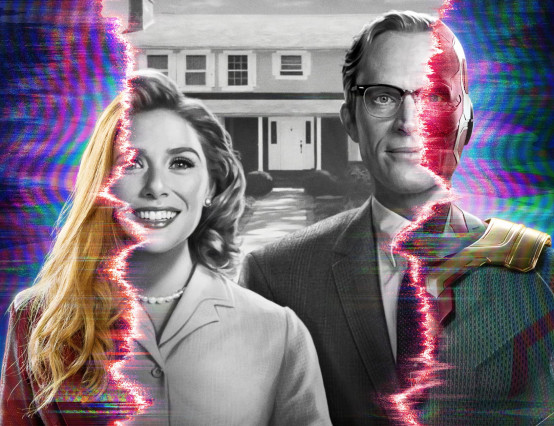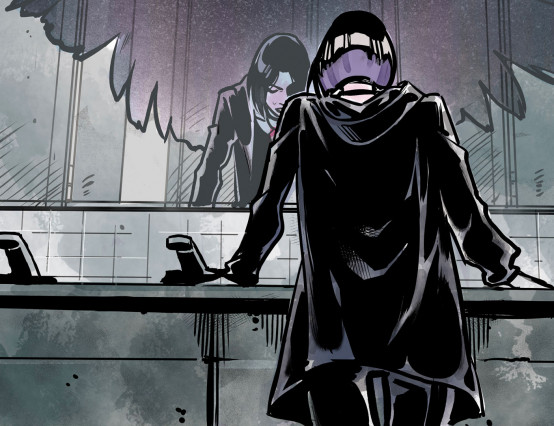TV shows and movies use the superhero genre to bring powerful and darker ideas to a wider mainstream audience. The examples explored in this article are all well known and often much-loved strong and confident characters, which filmmakers use to explore emotional issues and hidden mental battles. This highlights that everyone can be affected by such issues regardless of their strength.
These on-screen explorations of grief, loss and mental health focus upon the humanity behind the heroes powers, providing empathy with audiences via their experiences. This creates a connection between the ordinary viewers and the idealised on-screen heroes, showing that they all go through the same thing and using that empathy to emphasise high emotional stakes. They portray what it is like to experience loss, grief and the mental health effects of this accurately and unabashed, the depictions being raw, honest and earnest.
I’m using WandaVision, Supergirl, The Punisher and Jessica Jones as examples, although many more superhero movies and TV shows explore these ideas. These films and television series show that we all go through the same thing, that everyone experiences loss, grief and mental health issues - even superheroes.
One theme that multiple TV shows and films explore is the protagonists lived experience and how that can differ from outside perceptions. Recently, WandaVision has done an excellent job of showing the difference between a voyeur's outside perspective and the inner emotional experience of an individual. Acknowledging how personal subjective experiences differ from observed actions and perceptions is particularly relevant to people who, like Wanda, have experienced loss, mental health issues or trauma survivors.
During the series, Wanda’s actions are frequently misunderstood by the voyeurs (whether that be S.W.O.R.D listening in or us as viewers watching Disney+). As outsiders, S.W.O.R.D initially perceives her actions as unusual and strange, therefore immediately perceiving her as threatening, dangerous, violent and unpredictable, requiring quick containment.
However, Wanda remains completely unaware that she is being perceived in this way or judged by others until the final episode. Instead, she is busy being caught up in her inner emotional experiences and unconsciously simply emotionally responding to her grief, loss, pain, heightened sensory feelings and traumatic memories in the only way she can at that moment. It is unconscious, instinctive, uncontrollable and shows she is experiencing a crisis.
Supergirl serves as another example of this. The character experiences the loss of her family, identity and home, her refugee status and the loss of familiarity. Her private worries, trauma, insecurities, and lived experience of feeling alienated as Kara Danvers are hidden from the public perceptions of her as a heroic, powerful and confident Supergirl hero persona.
The Punisher’s actions to outsiders are merciless, dangerous and terrifying, yet, internally, he is experiencing something the in-screen public cannot comprehend. His side of the story is eradicated by what others perceive to be happening and his internal experiences and trauma are only fully shown to us as viewers.
To other characters in her show, Jessica Jones appears disorganised, messy, unmotivated and unreliable, yet as an audience following her experiences, we can see she is the opposite. Jessica experiences loss, grief and PTSD from past abuse and events, but this is not a reflection of her character. She is skilled and talented at her job despite initial perceptions. Meanwhile, the new people she encounters have little idea of the type of trauma and horrific events we as viewers have witnessed her experiencing. These series show how such internal experiences can be perceived completely oppositely by those looking on and how important it is to listen and recognise lived experience over voyeuristic assumptions.
Another aspect that WandaVision and other superhero tv shows highlight is that those experiencing crises of grief, loss or mental health need responses of love, support and friendship, not fear, judgement and alienation. Love and understanding serve to de-escalate whilst persecution and alienation causes escalation. The series explores how different approaches to those around her can either easily de-escalate the situation or heed into a full state of emergency. Vision, Monica, Darcy and Agent Woo bring safety and assurance, achieving relief, clarity and help to ease Wanda’s pain. In contrast, S.W.O.R.D and Heywood use fear and violence to worsen the entire scenario. It shows how we can be quick to judge others without understanding the nuances of what might be occurring.
This is a really important message that all these shows explore extensively and that we should all adopt in our real lives. You never know what might be going on in somebody's mind. You may think you know, but you may never fully see the full extent of their experience, trauma and struggle. It brings an important message to be kind, to use love and support to others rather than rushing to judgement or assumption. They could be struggling beyond what you can see, experiencing pain even beyond Vision.
Check back on my Voice profile after 27 June to read the conclusion to this piece!









0 Comments